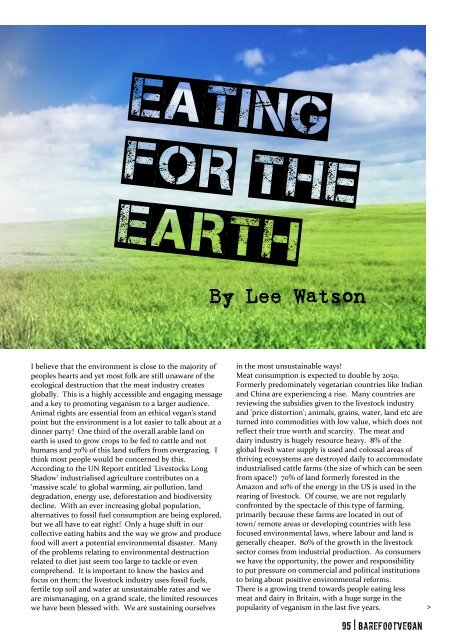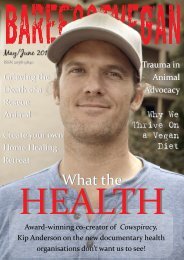barefoot vegan sept_oct issue.pdf
- No tags were found...
Create successful ePaper yourself
Turn your PDF publications into a flip-book with our unique Google optimized e-Paper software.
Eating<br />
for The<br />
Earth<br />
By Lee Watson<br />
I believe that the environment is close to the majority of<br />
peoples hearts and yet most folk are still unaware of the<br />
ecological destruction that the meat industry creates<br />
globally. This is a highly accessible and engaging message<br />
and a key to promoting <strong>vegan</strong>ism to a larger audience.<br />
Animal rights are essential from an ethical <strong>vegan</strong>'s stand<br />
point but the environment is a lot easier to talk about at a<br />
dinner party! One third of the overall arable land on<br />
earth is used to grow crops to be fed to cattle and not<br />
humans and 70% of this land suffers from overgrazing. I<br />
think most people would be concerned by this.<br />
According to the UN Report entitled 'Livestocks Long<br />
Shadow' industrialised agriculture contributes on a<br />
'massive scale' to global warming, air pollution, land<br />
degradation, energy use, deforestation and biodiversity<br />
decline. With an ever increasing global population,<br />
alternatives to fossil fuel consumption are being explored,<br />
but we all have to eat right! Only a huge shift in our<br />
collective eating habits and the way we grow and produce<br />
food will avert a potential environmental disaster. Many<br />
of the problems relating to environmental destruction<br />
related to diet just seem too large to tackle or even<br />
comprehend. It is important to know the basics and<br />
focus on them; the livestock industry uses fossil fuels,<br />
fertile top soil and water at unsustainable rates and we<br />
are mismanaging, on a grand scale, the limited resources<br />
we have been blessed with. We are sustaining ourselves<br />
in the most unsustainable ways!<br />
Meat consumption is expected to double by 2050.<br />
Formerly predominately vegetarian countries like Indian<br />
and China are experiencing a rise. Many countries are<br />
reviewing the subsidies given to the livestock industry<br />
and 'price distortion'; animals, grains, water, land etc are<br />
turned into commodities with low value, which does not<br />
reflect their true worth and scarcity. The meat and<br />
dairy industry is hugely resource heavy. 8% of the<br />
global fresh water supply is used and colossal areas of<br />
thriving ecosystems are destroyed daily to accommodate<br />
industrialised cattle farms (the size of which can be seen<br />
from space!) 70% of land formerly forested in the<br />
Amazon and 10% of the energy in the US is used in the<br />
rearing of livestock. Of course, we are not regularly<br />
confronted by the spectacle of this type of farming,<br />
primarily because these farms are located in out of<br />
town/ remote areas or developing countries with less<br />
focused environmental laws, where labour and land is<br />
generally cheaper. 80% of the growth in the livestock<br />
sector comes from industrial production. As consumers<br />
we have the opportunity, the power and responsibility<br />
to put pressure on commercial and political institutions<br />
to bring about positive environmental reforms.<br />
There is a growing trend towards people eating less<br />
meat and dairy in Britain, with a huge surge in the<br />
popularity of <strong>vegan</strong>ism in the last five years.<br />
><br />
95 | BarefootVegan





